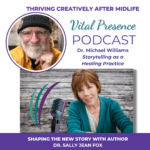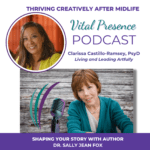 My friend Thinking is one of the world’s great unsung heroes and a good friend of mine. But she’s been looking depressed recently.
My friend Thinking is one of the world’s great unsung heroes and a good friend of mine. But she’s been looking depressed recently.
“People have stopped listening to me. In the old days, kings and philosophers, senators and academics would invite me to their salons. We’d sip warm brandy out of snifters and talk about big ideas. Sure, they were a little arrogant, but, truth is, they worshipped me.” (She blushed).
“A guy named Pascal even named a book after me.
Now, my agent says I have no caché.
“I did a Google search and you wouldn’t believe what people are saying about me. I saw this guy on YouTube, with a thick Brooklyn accent and long purple robes, who kept saying to his followers that thinking keeps you from BEING.” (She looked livid.)
“And there are plenty of hot shot entrepreneurs who tell me I’m boring, and that they think my friends Imagination and Intuition are way more cool. As if we don’t work as a team!
And others talk about me like I’m some cold, objective turd that doesn’t have any feelings.” (She was practically crying here.)
I handed her a kleenex.
“But you know what’s the worst?”
I waited.
“People have STOLEN my name. It’s an outrage! They take some stupid opinion they heard on a talk show, and then add my name to it and say garbage like, ‘I think the Syrian refugees are terrorists who shouldn’t be allowed to enter this country.’
That is NOT THINKING.” (She was practically screaming.) “They’re repeating pablum!. Lies! Make them stop using my name. Tell them, I’m going to sue!!!”
I tried to calm her. “You might want to think about that. Lawyers can be pretty expensive.”
I was trying hard to listen, but it felt like time for an intervention.
First, a hug. Then I suggested, “Let me interview you so we can bust up those myths about thinking you’ve been hearing. But after that, you have to promise to listen to my podcast with Nancy Kline, who has spent her life supporting people to create environments where they are able to think for themselves.”
She agreed.
Busting up 6 myths about thinking
1) Feeling is separate from thinking.
“Some of them blame me for wars and everything that goes on in those high tech ‘situation’ rooms under the guise of thinking. I remember the band of fools who used to hang out with Robert McNamara during the Vietnam War days. Believe me, I tried HARD to get through to them. I told them if they used a little compassion, common sense or even tried on a few contrarian perspectives, they wouldn’t be in such a mess.. But those boys didn’t want to hear me.
Broke my heart. I had to leave the room so they wouldn’t see me crying.

Tell me I don’t have feelings! Feelings are data. So are my intuitions and any hints I get from my body. I listen to it all!”
2) To obtain enlightenment, you must stop thinking.
“Enough! I’m tired of those guru-types mind-bashing with their ‘your mind is not your friend’ platitudes. Well, my mind IS my friend. My clear, objective, open, curious mind.
Not what I call my monkey-mind, the one that is always tossing me banana peels to slip on and chattering round the clock.
The only way to deal with it is to meditate. After all, I need to stay calm (I kind of fell off the wagon today), and observe my little monkey-thoughts without being so attached to them.
I just wish people would train their minds so they could ask a question and stay with it for more than a nano-second.
And stop using my name to describe how they swing from idea to idea trying to get those bananas.”
3) Too much thinking causes analysis paralysis.
“Oh please,” she said. “Do people really think this? NOT thinking things through causes analysis paralysis – getting stuck in some consideration, past feelings, or old assumptions. It’s when we’re stuck that we need to find better questions and try to listen more!”
4) Thinking is objective.
“I admit, I’ve got my own biases, prejudices and, if you haven’t noticed, some pride and a couple of opinions. My job is to notice them so they don’t run the show.
I’m always inviting people with really different points of view to spend time with me.
It keeps me young.” (She smiled.)
5) Thinking limits imagination.

“Haven’t they ever seen a poet working?
I’m always hanging out with my dream team of Inspiration, Imagination and Intuition. We offer the best creative mix you could find – better than any ad agency. One of them throws in an idea and I develop it.
Poets love us. So do authors and physicists.”
5) There’s no time to think – I need to act now.
“Ok. There may be emergencies where you need to be so ready and so practiced that you can think clearly without thinking about thinking. But this culture of urgency, where everybody is so stressed and people think they have to double-click their answers without even a pause – it’s burning everybody out – and I don’t see any great results.
Hey, why don’t we start the slow-down-to-think movement, kind of like slow foods?
If my agent likes it, maybe I’ll get famous again!”
6) Somebody can do the thinking for me.
Thinking stopped for a moment and got very serious.
“I know, nobody actually says this. But look at what they do. They listen to some bully demagogue who tells them to believe him because he has the truth about how to change the world. And then they turn off their minds and hand their brains to him on a silver platter. And because they aren’t thinking for themselves, they can’t even see how he is manipulating them.
Giving your independent thinking to anyone really scares me.”
She paused. “I guess that’s it for now.”
I reminded her that she promised to listen to my podcast interview with Nancy Kline, author of Time to Think and More Time to Think. At first she demurred, but now she’s a total Nancy fan.
“If people would just listen to Nancy and practice her ten components of a thinking environment, I wouldn’t have to work so hard.
And then maybe I’d get back some respect.”
I couldn’t agree more.










3 Responses
Excellent message, Sally and Nancy! Such a humane tone, too.
This doesn’t speak to your main point about why we feel the need to categorize people as “the other,” but rather to the list of startegies for responding to name-calling.
Do you remember the “cookies” kerfluffle when George H.W. Bush was running against Bill Clinton, and Bush criticized Hillary’s comment about “I could have stayed home baking cookies…”?
It was an unfair criticism, because Bush and the others omitted the following sentence, in which Hillary said that feminism meant the right of women to do as they wish, whether to stay home or have a career.
But Bill Clinton responded to Bush’s comment by putting it in a different light. He said, “You’d think he[Bush] was running for first lady.”
Suddenly, Bush looked like a laughing stock, not Hillary or Bill.
Let’s suppose, then, that your real disagreement with the person who said “You are the kind of person who eats puppies for breakfast” is his(her?) support of drone attacks in Syria. You might reply with something like, “Would you rather have someone who eats puppies or someone who kills hundreds of them by bombing the houses they live in?”
Or suppose that your basic disagreement is about education funding.
“I don’t know what puppies taste like. But I’m more concerned with giving our children the kind of education that will let them grow up to be successful adults who can afford to give their children a breakfast that’s both healthy and delicious!”
Or “Instead of talking about how to make sure that every child has a chance to make something of herself, (s)he’d rather talk about breakfast foods!”
This strategy is about showing the name-calling to be an attempt to divert attention from the real issues, in a (perhaps) humorous way.
Oops! I meant to post this to a different blog post:
https://www.engagingpresence.com/what-to-do-when-an-opponent-labels-you
I have put a slightly corrected version there.